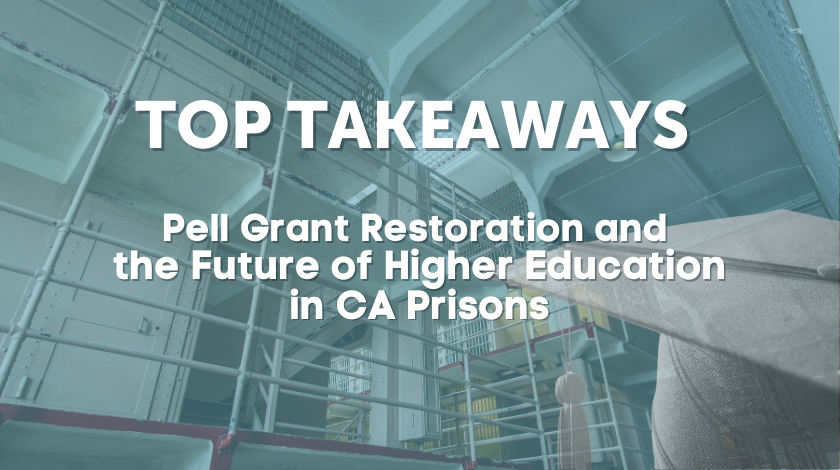Despite the benefits of higher education in prisons, more than twenty-five years ago, Congress banned incarcerated students from receiving Pell Grants to fund their education as part of a new tough-on-crime approach to criminal justice. Recent efforts by student activists, however, have succeeded in persuading Congress to lift the ban, effective in 2023. This access to government funding will help more students obtain their post-secondary degree and reduce recidivism rates.
On the heels of progress, Danny Murillo, co-founder of the Underground Scholars Initiative at the University of California Berkeley and current Cal State University of Long Beach graduate student, led us through a high-level briefing that touched on some of the most salient findings and recommendations from the research brief he authored with the Campaign for College Opportunity, The Possibility Report: From Prisons to College Degrees in California (supported by a Michelson Spark Grant in 2020). The report provides a thought-provoking overview of the state of higher education for currently and formerly incarcerated students and what remains to be addressed to support the success of these students. Recommendations centered around five key themes that emerged from student focus groups: probation/ parole, housing, employment, targeted student support, and career transition.
Rebecca Silbert, Senior Director of the Rising Scholars Network at the Foundation for California Community Colleges and higher education in prison champion, highlighted Pell Grant history and the California context for postsecondary programming in prison. As Rebecca artfully moderated the conversation, the panel of experts shared a common vision for higher education at the intersection of justice reform. The visions touched on the imperative for continued philanthropic and state support of in-prison educational programming, the importance of prioritizing face-to-face education for incarcerated students post-COVID, and the cascading effects investing in higher education can have among families and communities.
Key Panel Takeaways
Under California’s “Master Plan,” anyone from anywhere in California should be able to obtain a college degree, as Keramet Reiter from UCI LIFTED (Leveraging Inspiring Futures Through Educational Degrees) Director, noted. Collaborations across that state’s Community Colleges, California State Universities, and University of California college systems are finally incorporating incarcerated students into this vision. Now, there is an opportunity to leverage these partnerships towards supporting students interested in pursuing graduate school, professional school, and PhDs from and after prison: “Pell can further these pathways and truly mitigate the stigma associated with incarceration through advanced higher education attainment.” But philanthropic support continues to be vital to seeding and sustaining these programs.
While we work towards expanding educational opportunities to include graduate and professional school, Taffany Lim, Executive Director at Cal State LA’s Center for Engagement, Service and the Public Good, reminded the audience of the ripple effect higher education in prison programs can cause: “[It’s] not only inspiring them and their yard mates to go to school and pursue education, but it’s also encouraging their friends, their families, their neighborhoods, their aunts, their uncles, their cousins, their nieces, their children and future children. To me, that means what we’re ultimately doing is really breaking cycles of intergenerational incarceration.”
Expounding upon the compounding benefits, Romarilyn Ralston, Program Director of Project Rebound at California State University Fullerton, illustrated that investing in higher education is the transformative intervention individuals can benefit from most when they are caught up in the revolving door of the criminal justice system. She emphasized that incarceration and punishment is an ineffective and costly solution to societal ills and does not increase public safety. Instead, we need to provide resources, services, opportunities, and ways for individuals to reinvent their lives. “There’s no other reentry model that can produce what higher education does. That’s why we need to continue to invest in education and reduce all of the collateral consequences that having a criminal record has – the barriers to opportunities for housing and to employment.”
In closing, Lande Ajose, Senior Policy Advisor for Higher Education for the Office of Governor Gavin Newsom, delivered an inspiring keynote address. Emphasizing the importance of equity in California’s higher education system, Lande stated, “It’s about making sure everyone has high-quality access irrespective of where you find yourself learning. Irrespective of what has come in your past, so that you can create a better future.” We, at Michelson 20MM, could not agree more.
Pell Reinstatement is more than funding to cover college tuition costs for students in prison — it serves as a “national affirmative values statement that students in prison are important, valuable, and worthy of investment,” Emily Blake, Michelson 20MM Smart Justice Program Officer, shared.
The full recording is available on our YouTube channel and below. Once again, a special thank you to our speakers and distinguished panel of leaders in higher education.
Michelson 20MM was founded thanks to the generous support of renowned spinal surgeon and inventor Dr. Gary K. Michelson and his wife, Alya Michelson. The Michelson 20MM Foundation is dedicated to supporting and investing in leading organizations, technologies, and initiatives that seek to transform learning and improve access to educational opportunities that lead to a meaningful career. Learn more at www.20mm.org.
